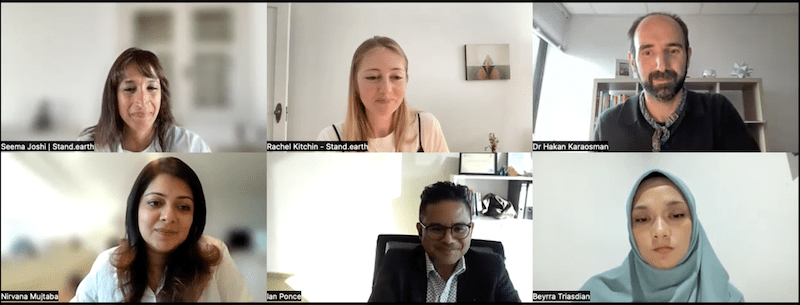AI-powered research holds banks accountable for greenwashing
August 1, 2024
So many data sources, so little time
As researchers, we all have folders of PDFs filled with information that we hope to find time to distill into useful insights. For Stand.earth Research Group (SRG) work on fossil fuel financing in the Amazon, these folders can seem endless. They contain thousands of pages of corporate disclosures, annual reports, environmental impact assessments, financial statements, government records requests, court transcripts, and research studies. And there are new items every day! Sometimes it feels impossible to keep up with the deluge of information constantly flooding in.
For example, SRG uses complex corporate documents to analyze banks’ Environmental and Social Risk Management (ESRM) policies. These policies come in different formats, use varied terminology, and include a range of qualifications and exceptions. Distilling these into meaningful insights about environmental protections is a tedious, time-consuming task – one we’ve done for years to publish reports such as Greenwashing the Amazon.
The work is worth it: it gets banks like Citi, the largest funder of oil and gas operations in Amazonia, to improve their policies’ protections by pointing out the gap between the banks’ expansive rhetorical commitments and their limited policy provisions and continued fossil fuel financing. But banks are frequently updating their policies, and more banks warrant monitoring than we have the resources to analyze.
Harnessing AI to create efficiencies
We wondered: could AI make our analysis of banks’ policies faster and more efficient? Enter Natural Language Processing (NLP), the AI technology behind Large Language Models (LLMs) like Chat GPT.
NLP technologies like LLMs are well-suited for the task. They can rapidly parse large volumes of text, identifying and extracting relevant information across varied formats and terminologies. Imagine that AI could interpret the complex language of bank policies and output a clear table of each bank’s exclusion and screen policies. This is what we are working to achieve. Harnessing this AI technology allows us to scale our efforts and keep pace with the ever-evolving landscape of environmental research.
Holding banks accountable
We believe SRG’s use of machine learning for extracting valuable data from complex corporate documents demonstrates how AI could fundamentally change the way we hold corporations accountable for disastrous impacts and ineffective policies. With less time spent digging for the right information, we researchers can spend more time distilling the information into insights and working with campaigners to translate insights into action.
– Brian Orland, Research Associate, Stand.earth Research Group



